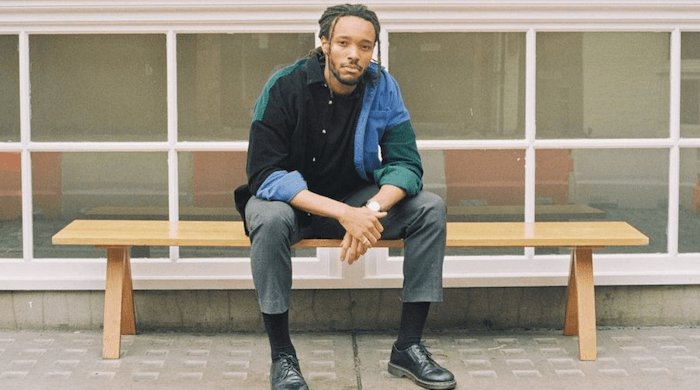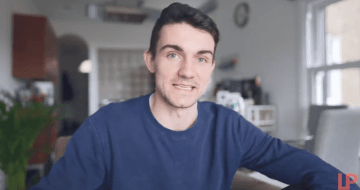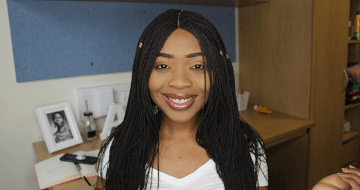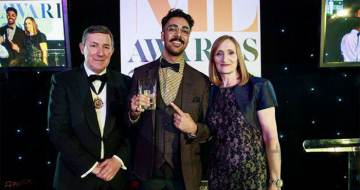A&O rookie and YouTuber Tashan Dwyer sits down with Legal Cheek to reflect on the challenges he’s overcome to realise his lawyer dream — and how he hopes to help others do the same

A trainee solicitor has opened up about his incredible journey from being a homeless law student to now working for one of the City’s most elite law firms.
Tashan Dwyer was a law fresher at Warwick University when he first heard the devastating news that his family faced homelessness. He was celebrating his 2:1 end of year result on his first ever parent-free holiday in Cologne, Germany. “My mum phoned me on the penultimate day of the holiday,” Dwyer tells Legal Cheek. “She said: ‘Tashan, I need you to come to court with me on the Monday you’re back. The landlords have evicted us from our home.’”
Days later, Dwyer, now a trainee at magic circle law firm Allen & Overy, found himself before a judge in the county court, ready to “fight this case” using whatever he could remember from his first-year studies. But having had little time to prepare and with his mother unfamiliar with the legal process, the hearing was unsurprisingly swift. “We lost the house in the space of 15 minutes,” he recalls.
Although they rented the London property, it was initially purchased by Dwyer’s parents after house prices collapsed following the 2008 financial crisis. “Things went south from there,” he says. His mother was later made redundant and his father’s wages were cut, leaving them no choice but to sell the house to a private landlord. The pressure led Dwyer’s parents, who had been together for 20 years, to separate. “Financial issues can really break down the fabric of the home,” he reflects.
It turned out his mother, who stayed in the house, had been struggling to meet rent payments for some time but had kept it from Dwyer so he could focus on his legal studies. “She didn’t want to distract me whatsoever,” he says.
His mother, with nowhere to go, stayed in emergency hostels for a year until the local authority could arrange proper housing. Fortunately, Dwyer was eventually able to return to his uni accommodation, but in his second year had to stay with friends during a summer vac scheme and other work experience placements in London. “It showed me the human side of law… you see how a decision can make or break people, and can really tear families apart,” he says.
Dwyer, who spent some of his childhood growing up on a council estate, alludes to balancing these pressures against general law student struggles in a recent vlog on his YouTube channel (embedded below), which breaks down his path to practice and the obstacles he faced along the way — including rejection and imposter syndrome. “I came from the bottom figuring things out,” the magic circle trainee tells viewers.
According to Dwyer — who secured his TC during his final year and graduated with a first class degree — the candid video was met with huge praise, with “nearly 100 people” reaching out for application advice, with some even sharing their own similar experiences.
Dwyer, who describes himself as a “normal guy”, plans to continue creating social media content offering an unfiltered look at lawyer life, which “bridges the gap between people who aren’t in the sector, who don’t have the networks, with someone who is but speaks on their level”.
“When we think about corporate law, the last thing people are thinking about is a guy with dreadlocks from inner-city London using the same dialect and slang as them but speaking about these major macro and microeconomic factors which shape the world and legal sector,” he tells Legal Cheek. “Hopefully, by simply being myself and offering laidback and informative content, others can see themselves in me and gain the insight they need to bridge the gap from where they are and where they want to be.”
Even so, Dwyer is careful to check his own privileges. “I was still a cis-gender, heterosexual, six-foot-two man, and able bodied, I could speak English,” he explains in his vlog. “I also went to Warwick — I went to a good Russell Group university… I still used mitigating circumstances when I needed to.”
Doing so is important because “people have their own challenges… and there are other hoops they need to jump through,” he says. “I don’t want to make a video that says, ‘oh you can do this, because I’ve done it’ because that’s really unrealistic and unfair,” Dwyer explains. “Yes, I’ve worked hard, but I’ve also had a lot of luck, lot of support and a lot of privilege as well.” Instead, he hopes viewers can relate where they can, but ultimately use his story to really “work out where you’re struggling and try and plug those holes as well”.


